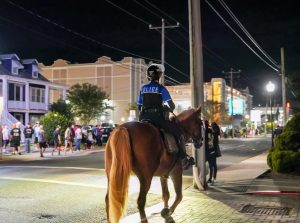
OCEAN CITY – Resort leaders say they hope to have a body-worn camera program in place by next summer.
In a meeting of the Ocean City Police Commission on Monday, Capt. Mike Colbert told resort leaders that command staff with the Ocean City Police Department (OCPD) have started working with the town’s information technology and purchasing departments to vet vendors and explore cost options for a body-worn camera program.
“We’re looking at between 170 and 200 cameras that we would need, depending on who falls under the criteria …,” he said. “There’s been a lot of talk of having public safety aides – they aren’t required by state law – have them covered as well. That adds to the cost obviously.”
Earlier this year, the Maryland General Assembly passed legislation mandating law enforcements agencies to wear body-worn cameras to document their interactions with the public. While departments have until 2025 to adopt the use of body-worn cameras, Colbert said the OCPD is hoping to launch a program by the start of next season.
“We’re shooting for next summer,” he said. “It’s an aggressive timeframe, but talking to all the players involved we think we can do it if that’s what the city wants to do. We’re going to set ourselves up so that we can be in the position to do that.”
Colbert said the department has narrowed it down to three potential camera vendors. He said the goal is to come back with cost estimates for the town to consider.
Mayor Rick Meehan noted the town would not only have to factor in the cost of equipment, but also the cost of storing and maintaining video footage.
“When it comes to cost, what we are looking at is the total cost to institute the program,” he said. “That includes personnel, everything.”
When asked if the town would issue a Request for Proposal (RFP), Colbert said it would. He noted the town would have an option to either buy or lease the cameras, or a hybrid of the two.
“There’s a lot of different models out there,” he added.
Colbert told commission members this week the department was looking to hold body-worn camera demonstrations in the fall. He said the department would also gather cost estimates for resort officials to consider.
“It’s not like buying a firetruck, where you pay for it over a period of time,” he said. “With this you pay a certain amount up front and then there’s a recurring cost every year for maintenance and storage.”
Meehan said the town would work with the Eastern Shore delegation to explore funding options.
“We’re going to be working with our delegate and senator, and other delegates and senators, that have an interest in this to see what type of state funding could be available,” he said.
After further conversation, Meehan agreed to revisit the issue at next month’s commission meeting.
“I think it’s good we’re taking the aggressive approach to try and have this implemented by next season,” he said.
By way of background, earlier this summer the OCPD began a discussion on the implementation of body-worn cameras after a series of highly publicized Boardwalk incidents in which the agency’s use of force was called into question.
In both cases, attempts to issue citations for vaping on the Boardwalk ended with physical confrontations between OCPD officers and the suspects, and resulting in the online circulation of cell phone footage showing snippets of the incidents. In the days that followed, the state’s Office of the Public Defender called on Ocean City’s police department to expedite its use of body-worn cameras.

